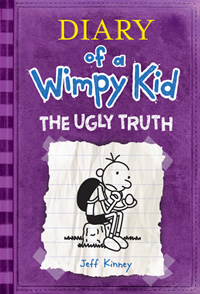[This article appeared originally November 10, 2010. It has been updated to reflect new event information and a new installment of the Wimpy Kid series.]
It’s the week after the election, and you’ve got another choice. This one is between the self-described “52nd or 53rd most popular kid” in middle school and the 43rd president of the United States. Do yourself a favor: go with the cartoon. Millions of American children can’t be wrong.
Diary of a Wimpy Kid: The Ugly Truth, the fifth book in Jeff Kinney’s massively successful series of children’s books, was released yesterday, November 9. Also published yesterday was Decision Points, the autobiography of George W. Bush. For the past week, the two have been battling for the top spot on the Amazon.com bestseller list, which—unlike media lists—also tracks prepublication sales. Though both books were embargoed until their release (and thus unavailable to reviewers), it’s a safe bet The Ugly Truth’s a better read.
Leaving aside any cheap shots about wimpy kids, bullies, or the ability to attract reluctant readers, the former president’s diaries don’t have Kinney’s charmingly minimalist line drawings and captions to move the story along. Besides, who wouldn’t rather read the hilarious story of a hapless but sly middle-school antihero named Greg Heffley instead of … well, let’s just say instead of any grown-up’s 512-page memoir?
The Wimpy Kid books are an astonishing phenomenon. What started as a serial comic posted online has become a wildly popular series. The original Diary of a Wimpy Kid was published in 2007 and promptly leapt to the top of the bestseller list. Suddenly, every kid in the world who was younger than, say, fourteen could quote from the misadventures of Greg and his maladjusted middle-school cronies.
 Subsequent volumes—Roderick Rules, The Last Straw, and Dog Days—surpassed the first book’s success. Inevitably, a movie was made. Through it all, Kinney (a computer programmer and video game designer who lives with his wife and two young sons in Massachusetts) is remarkably sanguine about the sensation he’s created. In an email interview the week before The Ugly Truth’s debut, Chapter 16 caught up with Kinney between talk-show appearances:
Subsequent volumes—Roderick Rules, The Last Straw, and Dog Days—surpassed the first book’s success. Inevitably, a movie was made. Through it all, Kinney (a computer programmer and video game designer who lives with his wife and two young sons in Massachusetts) is remarkably sanguine about the sensation he’s created. In an email interview the week before The Ugly Truth’s debut, Chapter 16 caught up with Kinney between talk-show appearances:
Chapter 16: So, Jeffrey! Tell us about your childhood! Were you always so smart and handsome? (I’m alluding, of course, to a passage on the second page of the first Wimpy Kid book.)
Kinney: Why, thank you! I’m afraid my looks have gone to seed and years of reality television have dimmed my wits. So I think I was better off in my youth.
Chapter 16: You’re credited with encouraging “reluctant readers” in real life, though Greg Heffley, the eponymous Wimpy Kid, is in the gifted reading group. (He says you can tell what group you’re in based on the covers of the books the teachers hand out: “Einstein as a Child” versus “Bink Says Boo.”) Yet in an interview with The Washington Post last year, you revealed that you originally conceived of Wimpy Kid as a book for adults. Did you ever think you’d emerge as a type of savior for kids who’d otherwise be stuck with “Bink Says Boo”?
Kinney: It’s true; I never intended to write for children. It happened completely by accident, or at least by my publisher’s design. But I think the fact that “reluctant readers” are becoming eager readers because of my books is a wonderful byproduct of the whole thing.
Chapter 16: Was the burnt-orange color of the first Wimpy Kid book’s cover really meant to reference J. D. Salinger’s The Catcher in the Rye? Any other wisecracking literary anti-heroes Greg might be descended from?
Kinney: It was, and it’s very cool that you picked up on that! I don’t know if Greg is descended from Holden Caulfield directly, but I think a part of that character must’ve registered in my subconscious along the way.
Chapter 16: J.K. Rowling has said that she made Harry Potter a boy in part because girls will read fiction with boy protagonists, but boys won’t read fiction with girl protagonists. Do you agree? Have you ever thought about what Greg Heffley’s female counterpart might be like?
Kinney: I agree. If I went on to write a book with a female protagonist, I would assume that I’d lose at least half of my audience. Girls are just more avid readers than boys. I don’t think I could create a credible female character as I’ve never been a female myself. But my hat’s off to J. K. Rowling for creating a credible boy in Harry Potter.
Chapter 16: You’ve said you originally saw it as a “loss” when your publisher wanted to turn what you conceived as a 700-page adult book into a kids’ series. Is that why—though the numbers would seem to prove you wrong—you often refer to yourself as a “failed cartoonist”?
Kinney: I consider myself to be a failed cartoonist because I never achieved the goal I set out to achieve: to break into the comics page of the newspaper. I’ll never feel like I’m a “real” cartoonist because of that. But of course I’m thrilled at what has happened to me and the reach I have through books.
Chapter 16: You haven’t quit your day job, and you’ve alluded to plans to end the Wimpy Kid series after a few more installments. Are you wary of being pigeonholed as That Wimpy Author? Where else would you like to turn your creative attention?
Kinney: I’d like to have another hit somewhere down the road, so that Diary of a Wimpy Kid isn’t the only memorable thing I ever create. And I’d also like to avoid becoming a rights manager of Diary of a Wimpy Kid for the rest of my life. I’d like to create new, relevant characters in multiple forms.
Chapter 16: How and where do you draw the line between being subversive and being obnoxious? I know some parents and teachers have expressed dismay that Greg is far from a behavioral or moral role model, though the kids obviously love and identify with him.
 Kinney: That’s something I struggle with when writing for Greg. It’s possible I’ve crossed the line once or twice. But I try to make Greg realistically flawed. He’s not a bad kid; he’s just a kid who hasn’t fully matured. I think we all do things that we’re not terribly proud of, and in Greg I’m trying to write about a kid who doesn’t always do the right thing, but is still relatable.
Kinney: That’s something I struggle with when writing for Greg. It’s possible I’ve crossed the line once or twice. But I try to make Greg realistically flawed. He’s not a bad kid; he’s just a kid who hasn’t fully matured. I think we all do things that we’re not terribly proud of, and in Greg I’m trying to write about a kid who doesn’t always do the right thing, but is still relatable.
Chapter 16: These days, it’s fashionable to lament that the Internet is killing the printed word. Yet you’re a kind of poster child for the argument that both types of “reading” can companionably exist. After all, Greg Heffley’s diaries first enjoyed tremendous success when posted serially on the web. Can the Internet, contrary to what many people believe, routinely spark and encourage the publication and sales of actual books, or do you see Wimpy Kid as a happy accident?
Kinney: I’m more concerned about digital readers than the Internet. Reading a book on a standard computer screen isn’t very pleasurable, so I don’t see it as a threat to the printed page. But electronic readers make it much more palatable. I’m hoping that e-readers don’t kill off the printed page, because a book is a sacred thing.
Chapter 16: I asked my older son (a high-school freshman) and his friends what they’d like to ask you, and they all wanted to know whether you were bullied in middle school. Do all the tragic bullying episodes in the news of late give you any insights into why your books are so popular?
Kinney: I only had a few bullying incidents as a kid. I take the issue of bullying very seriously, and I think social bullying, made easy by social network sites that are so popular amongst kids, is a huge societal problem. I don’t think the rash of bullying incidents has anything to do with the popularity of my books.
Chapter 16: My younger son’s third grade classmates, when polled, were overwhelmingly interested in what inspired you—for whom you named your characters, how long it takes to write each book, how you come up with plot ideas. These questions would seem to suggest that you’re not only enticing young readers, you’re encouraging young writers. Certainly the “handmade” (lined paper, line drawings) quality of the diaries might urge kids to try to write and illustrate books of their own. Do you think you’re motivating a generation of diary-writers as well as a generation of readers?
Kinney: I hope that my books inspire kids to be creative. In my simplified version of the world, I feel that you’re always either creating or consuming. I think that there’s a lot of great content out there for kids to consume, but I’m always encouraging kids to turn off the T.V. or computer and to create something new. I’d like to think that my books will encourage kids to pick up a pen and tell their own stories.
[This article appeared originally November 10, 2010. It has been updated to reflect new event information and a new installment of the Wimpy Kid series.]

Fernanda Moore has been a contributing writer to Chapter 16 since 2009. From 2012 to 2016, she was the fiction critic for Commentary; her work has also appeared in The New York Times Magazine, Marie Claire, New York, and Southern Living, among others.
Tagged: Children & YA





